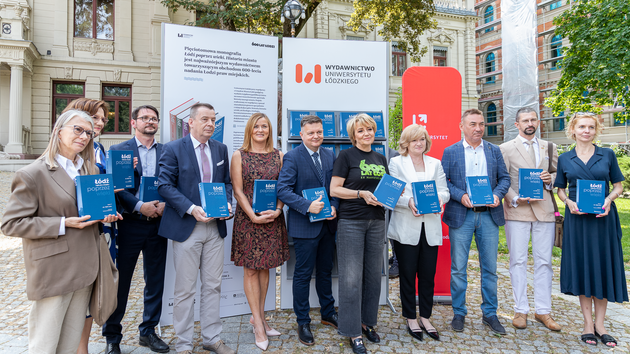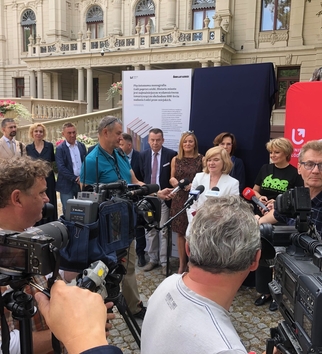During the press premiere representatives of the institutions cooperating in the creation of the monograph, a 5-volume monumental work for the 600th anniversary of Lodz stood in front of a large number of journalists. They were: Prof. Elżbieta Żądzińska – Rector of the University of Lodz, Hanna Zdanowska – Mayor of the city of Lodz, Halina Bernat – Director of the Lodz City Library, Ewa Bluszcz –Head of the Lodz University Press and scientists from the Faculty of Philosophy and History of the University of Lodz: Prof. Tadeusz Grabarczyk, editor of the first volume, and Prof. Jarosław Kita, chairman of the editorial committee, who supervises the entire monograph.
In her speech, Mayor of Lodz Hanna Zdanowska emphasised the uniqueness and exceptionality of the monograph, dedicating it to all citizens of Lodz on the occasion of the city's 600th anniversary. She also highlighted the gigantic work of the University of Lodz researchers working on this unique publication and the city institutions involved in its creation.
This beautifully produced publication is intriguing and raises questions: will we learn from it who we are, where do we come from, what connects us to the most ancient inhabitants of Lodz? It is possible that many of us have never thought that Lodz has a trace in Poland's medieval history. It is possible that it is only after reading the monograph we will begin to wonder about the phenomenon of such rapid development: "ex navicula navis – z łódeczki Łódź" – from a small forest settlement to a city of factories. This monograph is an example of successful cooperation between many institutions – local government, academia and cultural institutions. We get a glimpse of the city's identity through the eyes of specialists in many fields. The book is a monument to the 600th anniversary, but it is also our tribute and a form of thanks to the achievements of many scientists from Lodz. The passion for discovery drove this project. I hope that soon we will get to know new, unknown facts from the history of Lodz
– Hanna Zdanowska, Mayor of the city of Lodz.
Professor Elżbieta Żądzińska, Rector of the University of Lodz, referred to the very idea of publishing the monograph and to the painstaking work of academics on its elaboration.
Two years have passed since the authorities of the city of Lodz and the University of Lodz, together with partner institutions, signed a letter of intent to produce a five-volume publication on the history of Lodz. Today, a week before the city's 600th birthday, we come together to proudly present you with the first of five volumes of the unique monograph "Łódź poprzez wieki". This is a unique publication, as the monograph has been prepared by a team of more than 100 researchers representing various scientific disciplines: historians, archaeologists, art historians, linguists, sociologists, as well as geographers. This unique initiative is not only an expression of the university's social mission to be of service to society but is also an expression of the openness and diversity in our university's cooperation with the social, economic and cultural environment. The excellent cooperation with the city is particularly noteworthy here
– said Professor Elżbieta Żądzińska at the presentation of the first volume.
The Rector of the University of Lodz also thanked the Faculty of History and Philosophy for the initiative and for the passion that made this initiative possible. Additionally, she emphasised the role of the Lodz University Press, which was responsible for the extremely complex publishing process:
Thank you for ensuring that the monograph was published in accordance with the procedures for scientific papers, but also in a form that is attractive to the reader. This involved editing, graphic design, typesetting, production and an appropriate promotional setting. I would also like to thank all those who have contributed and are contributing to the monograph: the city authorities, the City Library in Lodz, the editors, the authors, the partners in publishing the book and its promotion: the State Archive in Lodz, Museum of Independence Traditions, Museum of the City of Lodz. And I strongly encourage all residents of Lodz to learn more about the history of our city.
The historians from the University of Lodz, the editors of the publication, spoke about the contents of the just-released first volume and the layout of the monograph as a whole..
The first volume covers the period from pre-historic times to 1820, i.e. the period of pre-industrial, the so-called agricultural Lodz. Before Lodz became a large industrial city it used to function as a small town in the midst of forests, with a small population. The 19th century came along and things changed. This is the period that is least known when it comes to the history of Lodz, which definitely argues for reaching for this volume. I dare say it is written by the best possible experts – art historians, archaeologists, philologists, most of who are associated with the University of Lodz. Thus, this is a book about Lodz prepared by residents of Lodz, with the participation of the city authorities and the Lodz community. I think it will be interesting for the Lodz residents, but others who are interested will also reach for it
– Prof. Tadeusz Grabarczyk from the Institute of History, University of Lodz.
The five-volume monograph will be the most important publication to accompany the 600th anniversary of granting city rights to Lodz which falls in 2023. Volume two will be published on 11 November this year, volume three in March 2024 and volume four on 29 July 2024, at the end of Lodz's jubilee year. Volume five containing the so-called oral history will be a supplement to the series, and its release date is not yet known.
The monograph "Łódź poprzez wieki.Historia miasta", a chronological arrangement of the volumes:
- Łódź poprzez wieki. Historia miasta. Dzieje Łodzi do 1820 roku [Lodz Through the Ages. History of the City. The history of Lodz until 1820] (ed. Tadeusz Grabarczyk)
- Łódź poprzez wieki. Historia miasta. 1821-1914 [Lodz Through the Ages. History of the City. 1821-1914] (ed. Jarosław Kita)
- Łódź poprzez wieki. Historia miasta. 1914-1945 [Lodz Through the Ages. History of the City. 1914-1945] (ed. Przemysław Waingertner)
- Łódź poprzez wieki. Historia miasta. Dzieje Łodzi po 1945 roku [Lodz Through the Ages. History of the City. History of Lodz after 1945] (ed. Krzysztof Lesiakowski)
- Łódź poprzez wieki. Historia miasta. Suplement [Lodz Through the Ages. History of the City. A Supplement] (ed. Mariusz Goss)
The project involves city institutions – the Museum of the City of Lodz, the Museum of Independence Traditions in Lodz, the State Archive in Lodz and the City Library in Lodz, which is the co-editor of the Lodz University Press in this endeavour. University of Lodz, in cooperation with the City of Lodz, has undertaken the publication of this unusual publication to celebrate the 600th anniversary of Lodz. During the 598th anniversary of granting city rights to Lodz, a letter of intent to this effect was signed by Mayor – Hanna Zdanowska, Rector of the University of Lodz – Prof. Elżbieta Żądzińska and the project's partner institutions in the garden of the Museum of the City of Lodz – Poznański’s Palace.
Source: Lodz University Press, City of Lodz Office
Edit: Communications and PR Centre, University of Lodz
Photos: Mateusz Kowalski, Marcin Kowalczyk (University of Lodz)







